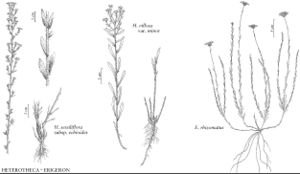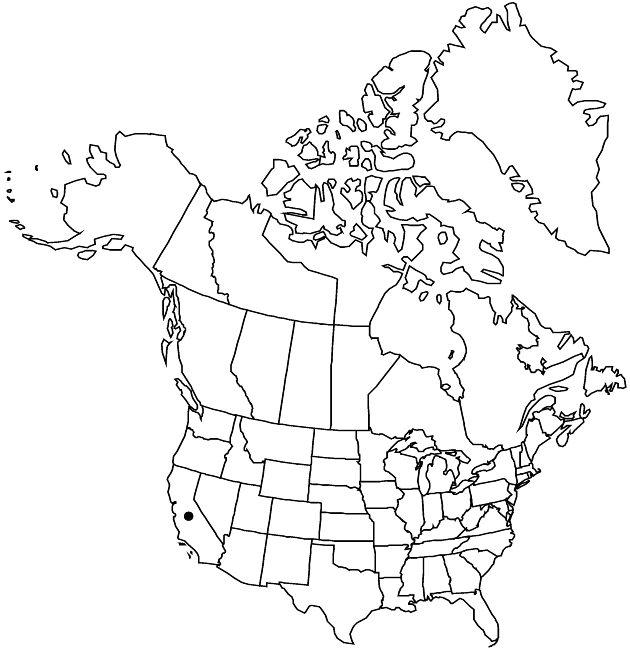Difference between revisions of "Heterotheca sessiliflora subsp. echioides"
Phytologia 73: 450. 1993.
FNA>Volume Importer |
FNA>Volume Importer |
||
| Line 10: | Line 10: | ||
|name=Chrysopsis echioides | |name=Chrysopsis echioides | ||
|authority=Bentham | |authority=Bentham | ||
| + | |rank=species | ||
|publication_title=Bot. Voy. Sulphur, | |publication_title=Bot. Voy. Sulphur, | ||
|publication_place=25. 1844 | |publication_place=25. 1844 | ||
| Line 16: | Line 17: | ||
|name=Chrysopsis californica | |name=Chrysopsis californica | ||
|authority=Elmer | |authority=Elmer | ||
| + | |rank=species | ||
}} {{Treatment/ID/Synonym | }} {{Treatment/ID/Synonym | ||
|name=Chrysopsis camphorata | |name=Chrysopsis camphorata | ||
|authority=Eastwood | |authority=Eastwood | ||
| + | |rank=species | ||
}} {{Treatment/ID/Synonym | }} {{Treatment/ID/Synonym | ||
|name=Chrysopsis vestita | |name=Chrysopsis vestita | ||
|authority=Greene | |authority=Greene | ||
| + | |rank=species | ||
}} {{Treatment/ID/Synonym | }} {{Treatment/ID/Synonym | ||
|name=Chrysopsis villosa var. camphorata | |name=Chrysopsis villosa var. camphorata | ||
|authority=(Eastwood) Jepson | |authority=(Eastwood) Jepson | ||
| + | |rank=variety | ||
}} {{Treatment/ID/Synonym | }} {{Treatment/ID/Synonym | ||
|name=Chrysopsis villosa var. echioides | |name=Chrysopsis villosa var. echioides | ||
|authority=(Bentham) A. Gray | |authority=(Bentham) A. Gray | ||
| + | |rank=variety | ||
}} {{Treatment/ID/Synonym | }} {{Treatment/ID/Synonym | ||
|name=Heterotheca camphorata | |name=Heterotheca camphorata | ||
|authority=(Bentham) Shinners | |authority=(Bentham) Shinners | ||
| + | |rank=species | ||
}} {{Treatment/ID/Synonym | }} {{Treatment/ID/Synonym | ||
|name=Heterotheca echioides | |name=Heterotheca echioides | ||
| − | |authority= | + | |authority= |
| + | |rank=species | ||
}} {{Treatment/ID/Synonym | }} {{Treatment/ID/Synonym | ||
|name=Heterotheca sessiliflora var. bolanderioides | |name=Heterotheca sessiliflora var. bolanderioides | ||
|authority=Semple | |authority=Semple | ||
| + | |rank=variety | ||
}} {{Treatment/ID/Synonym | }} {{Treatment/ID/Synonym | ||
|name=Heterotheca sessiliflora var. camphorata | |name=Heterotheca sessiliflora var. camphorata | ||
|authority=(Eastwood) Semple | |authority=(Eastwood) Semple | ||
| + | |rank=variety | ||
}} | }} | ||
|hierarchy=Asteraceae;Asteraceae tribe Astereae;Heterotheca;Heterotheca sessiliflora;Heterotheca sessiliflora subsp. echioides | |hierarchy=Asteraceae;Asteraceae tribe Astereae;Heterotheca;Heterotheca sessiliflora;Heterotheca sessiliflora subsp. echioides | ||
| Line 55: | Line 65: | ||
|elevation=10–2100 m | |elevation=10–2100 m | ||
|distribution=Calif. | |distribution=Calif. | ||
| − | |discussion=<p>Subspecies echioides is the most common and widely distributed subspecies, growing in most of central and southern California west of the Sierra <i>Nevada</i> and deserts. It is characterized by its coarse, hispido-strigose indument on the stems and leaves, at least on the proximal portions of the plant. Three varieties have been recognized on the basis of leaf indument and, to a lesser degree, leaf margin undulation, stem height, and number of heads per shoot. Diploid var. echioides has coarse, spreading hairs on the distal stems, peduncles, leaves, and bracts. In the southern part of the range and in the Tehachapi Mountains, the distal stem leaves of var. echioides are somewhat undulate, but this is not the case farther north or in other varieties of the subspecies. It is the weedy race of the species and occurs throughout much of the range of the subspecies. It is difficult to distinguish from less typical individuals of var. camphorata (diploids and tetraploids), which is much less hispid and more stipitate-glandular distally on the stems. It occurs in the coastal ranges from Santa Clara to northern San Luis Obispo counties. The serpentine endemic var. bolanderioides has larger heads, more longer hairs on the corolla lobes than var. echioides, usually is much shorter in stature, and sometimes has whitish leaves due to the dense hispido-strigose hairs; it occurs mostly on hill and mountain tops surrounding San Francisco Bay. It is the only exclusively tetraploid member of the species. Individuals can be similar in appearance to plants of < | + | |discussion=<p>Subspecies echioides is the most common and widely distributed subspecies, growing in most of central and southern California west of the Sierra <i>Nevada</i> and deserts. It is characterized by its coarse, hispido-strigose indument on the stems and leaves, at least on the proximal portions of the plant. Three varieties have been recognized on the basis of leaf indument and, to a lesser degree, leaf margin undulation, stem height, and number of heads per shoot. Diploid var. echioides has coarse, spreading hairs on the distal stems, peduncles, leaves, and bracts. In the southern part of the range and in the Tehachapi Mountains, the distal stem leaves of var. echioides are somewhat undulate, but this is not the case farther north or in other varieties of the subspecies. It is the weedy race of the species and occurs throughout much of the range of the subspecies. It is difficult to distinguish from less typical individuals of var. camphorata (diploids and tetraploids), which is much less hispid and more stipitate-glandular distally on the stems. It occurs in the coastal ranges from Santa Clara to northern San Luis Obispo counties. The serpentine endemic var. bolanderioides has larger heads, more longer hairs on the corolla lobes than var. echioides, usually is much shorter in stature, and sometimes has whitish leaves due to the dense hispido-strigose hairs; it occurs mostly on hill and mountain tops surrounding San Francisco Bay. It is the only exclusively tetraploid member of the species. Individuals can be similar in appearance to plants of <i></i>subsp.<i> bolanderi</i>, and in indument to var. camphorata and var. echioides. Intermediates between var. echioides and var. camphorata occur.</p> |
|tables= | |tables= | ||
|references= | |references= | ||
| Line 64: | Line 74: | ||
-->{{#Taxon: | -->{{#Taxon: | ||
name=Heterotheca sessiliflora subsp. echioides | name=Heterotheca sessiliflora subsp. echioides | ||
| − | |||
|authority=(Bentham) Semple | |authority=(Bentham) Semple | ||
|rank=subspecies | |rank=subspecies | ||
| Line 79: | Line 88: | ||
|publication year=1993 | |publication year=1993 | ||
|special status= | |special status= | ||
| − | |source xml=https://jpend@bitbucket.org/aafc-mbb/fna-data-curation.git/src/ | + | |source xml=https://jpend@bitbucket.org/aafc-mbb/fna-data-curation.git/src/eaa6e58056e40c9ef614d8f47aea294977a1a5e9/coarse_grained_fna_xml/V19-20-21/V20_526.xml |
|tribe=Asteraceae tribe Astereae | |tribe=Asteraceae tribe Astereae | ||
|genus=Heterotheca | |genus=Heterotheca | ||
Revision as of 19:29, 16 December 2019
Stems 1–20, (10–)26–65(–80) cm, sparsely to densely hispido-strigose (long-hispid hairs many), sparsely to moderately stipitate-glandular, sometimes sparsely hispido-strigose and densely stipitate-glandular distally. Cauline leaves: proximal subsesile to sessile, blades oblanceolate, (8–)15–35(–47) × (2.4–)3.6–62(–90) mm, margins entire, proximally with spreading, large, stiff strigose cilia, apices acute, faces sparsely to densely hispido-strigose, sparsely to densely stipitate-glandular; distal sessile, blades lanceolate, 6.5–40 × 1.5–7.7 mm, reduced distally, bases rounded, margins flat to ± undulate, abundantly spreading-ciliate, faces sparsely to densely hispido-strigose, sparsely to densely stipitate-glandular. Peduncle bracts 0–5, grading from leaves, reduced distally, those subtending head not larger and more leafy, faces sparsely to moderately hispido-strigose, moderately to densely stipitate-glandular. Involucres 6.3–10(–12) mm. Ray florets (6–)8–14(–17); laminae (4.5–)5.8–9.8(–13) mm. Disc florets: corolla lobes sparsely pilose (hairs 0.2–1 mm). Cypsela faces moderately to densely strigose. 2n = 18, 36.
Phenology: Flowering (May–)Jul–Oct(–Dec).
Habitat: Chaparral scrub, arid prairies, pastures, fields, near washes, roadsides, disturbed areas, sandstone outcrops, sandy, gravelly soils
Elevation: 10–2100 m
Discussion
Subspecies echioides is the most common and widely distributed subspecies, growing in most of central and southern California west of the Sierra Nevada and deserts. It is characterized by its coarse, hispido-strigose indument on the stems and leaves, at least on the proximal portions of the plant. Three varieties have been recognized on the basis of leaf indument and, to a lesser degree, leaf margin undulation, stem height, and number of heads per shoot. Diploid var. echioides has coarse, spreading hairs on the distal stems, peduncles, leaves, and bracts. In the southern part of the range and in the Tehachapi Mountains, the distal stem leaves of var. echioides are somewhat undulate, but this is not the case farther north or in other varieties of the subspecies. It is the weedy race of the species and occurs throughout much of the range of the subspecies. It is difficult to distinguish from less typical individuals of var. camphorata (diploids and tetraploids), which is much less hispid and more stipitate-glandular distally on the stems. It occurs in the coastal ranges from Santa Clara to northern San Luis Obispo counties. The serpentine endemic var. bolanderioides has larger heads, more longer hairs on the corolla lobes than var. echioides, usually is much shorter in stature, and sometimes has whitish leaves due to the dense hispido-strigose hairs; it occurs mostly on hill and mountain tops surrounding San Francisco Bay. It is the only exclusively tetraploid member of the species. Individuals can be similar in appearance to plants of subsp. bolanderi, and in indument to var. camphorata and var. echioides. Intermediates between var. echioides and var. camphorata occur.
Selected References
None.

